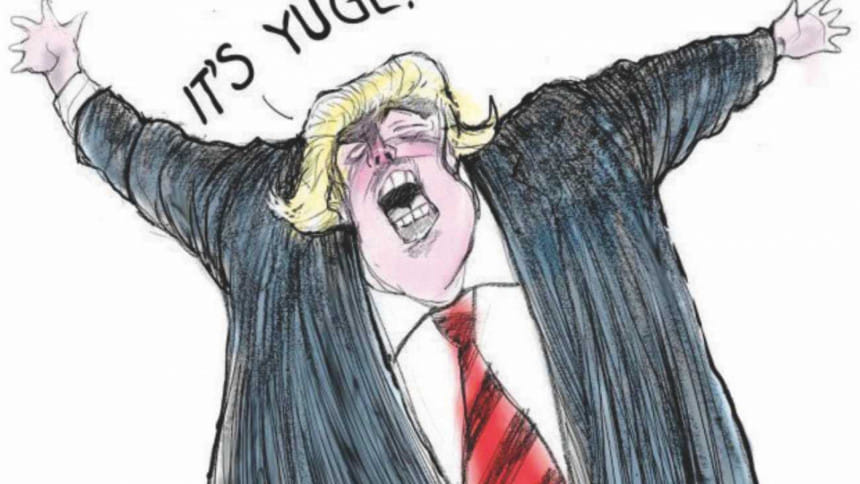Translating Donald speak

Translating Donald Trump is, well, an awkward process. After all, the president of the free world has about as much respect for basic grammar, word choice and sentence structure as he does for immigrants, women and the environment. So when one not only has to make sense of what he says, but also relay that nonsense to an audience in a different language, it's enough to wish that the Babel Fish from The Hitchhiker's Guide to the Galaxy (which can translate every single language in the universe) were real.
I worked for three years at a Bengali daily until recently. Among my job responsibilities was to translate news reports originally written in English into Bengali. In order to conform to our local standard, we normally adhere to abstract translation, but Donald Trump's idiosyncrasies often leave us hanging in the air. We simply can't keep his quotes intact. Let me cite some reasons why.
His attention span is notoriously short: 12 seconds, according to some assessment. In the midst of a sentence, he takes a break to say something different, and then resumes.
"It's crazy what's going on—whether it's the Middle East or you look at—no matter where the—Ukraine—you look at—whatever you look at, it's got problems, so many problems," he said in a press conference. You would tackle this situation by putting them within an em dash, but that's in English. In Bengali, it's near impossible to connect the two (or many) sides of the em dash.
"Right?" is another phrase he very often uses at the end of a sentence. We just can't write "thik ache?" or "tai na?" over and over again. It sounds ridiculous.
Donald Trump is a master when it comes to giving his enemies a bad name. Remember how he popularised the word "crooked" for his presidential opponent, Hillary Clinton, and media outlets critical of him?
He later chose to use "fake news" to describe media outlets such as CNN and New York Times. Fake news could mean an inaccurate article, but an entire media outlet is not "news" to be "fake", is it?
When praising something, he is not very innovative, resorting mostly to a set of fixed words, like great, tremendous, terrific, amazing, tough, wonderful and 'yuuugee'. Basically all of them give the same impression, but he uses more than one such word to describe the same person or thing as if they have different meanings. These are among the many times we scratch our heads when trying to make sense of this guy!
And the excessive overuse of superlatives? To him, you are either "the best", or "the worst"; and he is the "greatest of all time". Now, when I translate superlatives such as "I'm the most militaristic person," or "No one builds walls better than me," or "Single greatest witch hunt of a politician in American history", wouldn't I end up making myself sound stupid?
It's not just his grammar or vocabulary. Sometimes his choice of adjective is so inappropriate that it contradicts the mood of the moment. While commemorating Black History Month, for example, he honoured the "tremendous" history of the black people. The whole point of the Black History Month is to commemorate the struggle and sacrifice of the black people, but to him it's "tremendous". This is simply an absurd abuse of adjective.
Nope, I'm not done yet. In fact, he began that very speech with an even crazier claim! "The election, it came out really well. Next time we'll triple it up or quadruple it, right? We want to get over 51 [percent], right? At least 51," he said. How could he triple or quadruple his vote share? That's just impossible, mathematically.
Trump is infamous for making defamatory remarks about his adversaries, but when his target is a woman, he chooses womanly attributes to insult her.
While criticising former FOX News host Megyn Kelly, he said she had "blood coming out of her whatever." It's easy for English speakers to comprehend what he wanted to mean, but our Bengali readers would hardly understand a thing even if we were somehow able to translate it literally. Or, recently, when he attacked MSNBC host Mika Brzezinski by saying she was "bleeding badly from a face-lift", it was beyond our understanding that why it was even relevant, let alone making sense of it in Bengali.
Worse still are his tweets, which given the fact that you only have 140 characters to send out a message to the rest of the world, you would think that Trump would try to make better use of it, but he still chooses to mess up occasionally. His late-night tweets are the best, as one would assume that after a sleepless night of counting every single head in his inauguration ceremony, he doesn't have much patience left so he decides to confuse 'conference' with 'covfefe'.
While dealing with a politician, we leave out his or her rhetoric, and instead try to understand the context and core meaning. Trump is a challenging task, but we do polish his words as much as we can. The next day when we see the newspaper and read his quotes again, even we fail to recognise him.
Nazmul Ahasan is a member of the editorial department, The Daily Star.

 For all latest news, follow The Daily Star's Google News channel.
For all latest news, follow The Daily Star's Google News channel. 



Comments